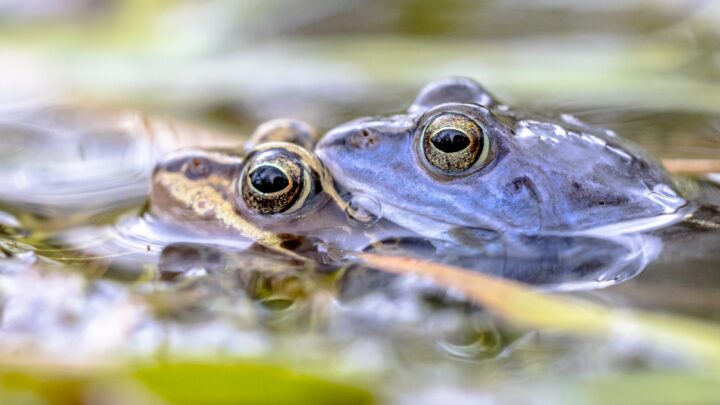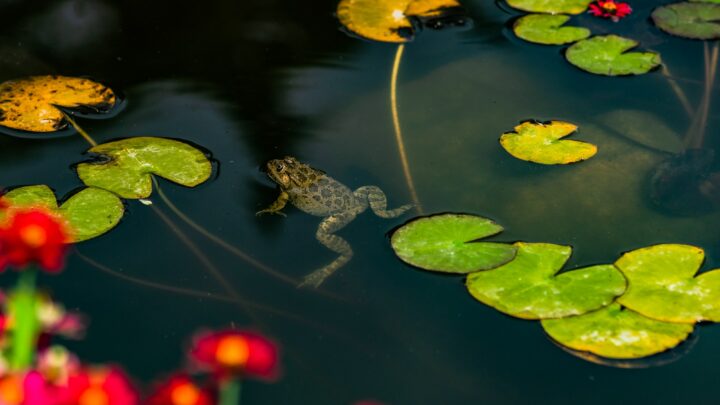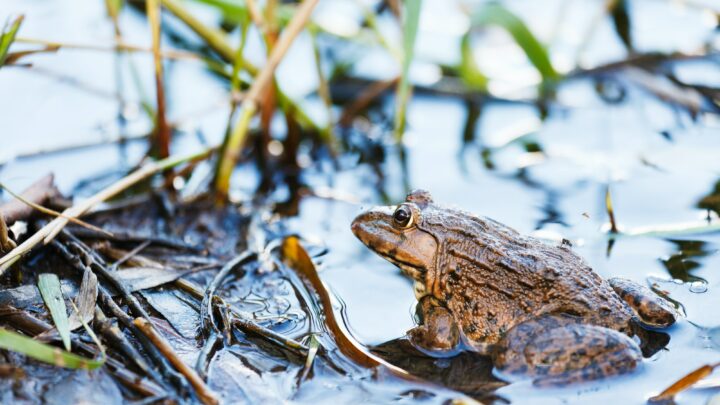Frogs are amphibians that can be found in many different environments. But when it comes to water, they have a tendency to stay submerged for long periods of time without coming up for air.
So, how long can frogs stay underwater?
How Long Do Frogs Stay Underwater?
No official studies have been done to see exactly how long a frog can stay underwater. Because frogs can absorb oxygen through their skin, hypothetically they should be able to stay underwater indefinitely in ideal conditions.

How Long Frogs Can Stay Underwater
What Affects How Long A Frog Can Stay Underwater
The three major reasons a frog decides to get out of the water are oxygen levels, temperature, and physiological needs.
Low Oxygen Levels In Water
Since frogs can breathe underwater, it would be hypothetically possible for them to live underwater as long as they wanted. The only problem is that stagnant water areas don’t have as much oxygen as others.
Most frogs stay in stagnant waters in ponds or creeks, but the stagnant waters don’t dissolve enough oxygen for the frog to breathe.
Almost immediately, the frog will need to surface to start breathing through its lungs.

Low Oxygen Levels In Water
The Temperature Is Too Hot
As the weather starts to warm up, the frog’s metabolism starts to work much faster. The metabolism needs plenty of oxygen to function efficiently, so the frog will do whatever it has to in order to find oxygen.
Frogs who catch themselves in hot water, literally, will need to get out much quicker due to a faster metabolism needing more oxygen.
The absorption through the skin won’t be enough and the frog will need to use its lungs by surfacing.
The Frog Has Physiological Needs
Two of the frog’s main drives are eating and mating. When there isn’t enough food in the area or the frog can’t find a mate in water, it will search on land to get either.
If there is a drought in the area and the water starts to subside, the frog might not be able to get enough food or oxygen. It will be forced to find another source of water nearby.
The Thickness of the Frog’s Skin
Different frog species have different thicknesses of skin. This will make it harder for thick-skinned frogs to absorb the same rate of oxygen as frogs with thinner skin.
Some species of frogs even retain their gills even after maturing into adulthood.
Have Frogs Always Been Able to Stay Underwater: The Answer
Before a frog is able to get out of the water at all, it needs to develop from the tadpole stage.
When the frog is born, it comes out as a tadpole and lives exclusively in water for the first 12 weeks of its life. Tadpoles actually have gills just like other fish which help them live in water without needing to surface for air.
As the tadpole transitions into an adult, it will lose the gills and develop a set of lungs, preparing it for life outside of water.
How Do Frogs Stay Underwater
Frogs have lungs just like humans that allow them to breathe oxygen just like you and me.
What makes frogs special is their ability to absorb oxygen with their skin. This allows them to survive both on land and underwater.
The skin is so thin that the blood vessels sitting underneath the skin are able to suck the oxygen right out of the air or water. Frogs use their skin to absorb water as well.
When they’re in action mode is the only time frogs use their lungs. So when they’re hopping around from place to place and need more oxygen than their skin can absorb, they will start to use their lungs.
In the same way that humans can drown because water fills their lungs, frogs will undergo the same fate if they can’t absorb enough oxygen while underwater.
So even though frogs can stay underwater for long periods of time, they need to have specific conditions met in order to do so.

Frogs can absorb oxygen with their skin
Frequently Asked Questions about How Long Frogs Can Stay Underwater
What Does A Frog Do Underwater?
Frogs will primarily look for food and lay their eggs underwater. There are many small pieces of food they can find in water and many flies they can grab on the top of the water. Frogs will lay their eggs underwater because babies will come out as tadpoles in the early stages of life.
Do Frogs Drink Water?
Frogs, like other amphibians, do not actually drink water but instead absorb it through their skin. There are species that do not return to water unless it is breeding season. These types of frogs will gather moisture through their skins by hiding in dark, damp areas like under rocks, logs, or debris.
Frogs Can Stay Out Of the Water for How Long?
Frogs are able to stay out of water for a long period of time if they can find damp areas to absorb moisture through their skin. Some species will stay out of water for most of their lives and return when it’s breeding season.
How Do Frogs Find Water?
There are hundreds of blood vessels right below the thin skin of the frog that is able to absorb moisture right from the air. Because of this, frogs are highly sensitive to any humidity or moisture in the area and they will move toward a location that has more moisture than others.
Frogs Can Live Underwater
In ideal conditions, frogs can hypothetically live in water for their entire life. This is because they can absorb oxygen right into their blood vessels.
Usually, they will surface to find food, find a mate, or because there isn’t enough oxygen in the water.
Read about do frogs drink water next.


